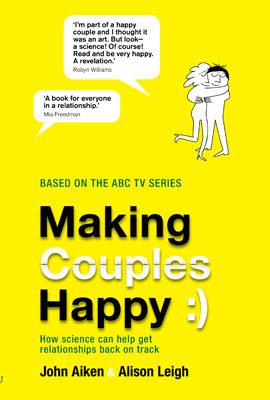Making Couples Happy

Making Couples Happy
There is a 5:1 ratio of positive to negative comments and gestures in stable marriages.Marriages where the husband resists sharing power are four times more likely to end or to continue unhappily than when he doesn't.
The more possible it is to compromise with your partner, the more influence you will have over him or her.
Four simple steps to happily ever after: Talk. Connect. Support. Dream.
Making Couples Happy, the companion to the ABC-TV series, uses science to help couples rediscover happiness in their relationships and get them on the path to enduring love.
Couples and singles will identify with the raw honesty of common hurts and resentments, disillusionment and despair that plague many relationships. Equally, they will share in the breakthroughs and ultimate triumphs, and learn the four simple steps that will help them better talk, support, connect and dream together.
Making Couples Happy readers who follow the easy steps and activities can expect a significant improvement in how they relate to their partners, and learn to communicate more effectively, argue less, be kinder and achieve new levels of trust and intimacy.
John Aiken is a trained clinical psychologist and has worked on TV, radio and for lifestyle magazines. His two previous books are U-Turn: Putting You Back into Your Relationship and Accidentally Single. He is the resident psychologist on RSVP and appears regularly on Channel Seven's Sunrise.
Alison Leigh has been a journalist and broadcaster for over 30 years. She has written for a variety of women's magazines in Australia and New Zealand.
Making Couples Happy
Allen and Unwin
Authors: John Aiken and Alison Leigh
ISBN: 9781743313510
Price: $29.99
Interview with John Aiken
Question: Why did you decide to write Making Couples Happy?
John Aiken: I'm passionate about empowering couples to get better relationships. It was an opportunity to create a step by step easy to follow practical guide to help couples so they can improve their relationship happiness.
Question: Tell us about the TV series airing in February, Making Couples Happy.
John Aiken: The TS series involved myself and a team of experts taking foru couples in crisis through an eight week bootcamp. We gave them science based techniques that allowed them to learn new habits to improve their levels of happiness. It was raw and real, and it was amazing to see how the couples took up the challenges and changed their lives.
Question: What are the main reasons relationships fail?
John Aiken: I think the biggest single reason relationships fail is due to poor communication. It all stems from there. If you're not able to communicate and listen, then you begin to drift apart, issues don't get involved, resentments occur and relationships fall apart. The series and book outline key communication tips that all couples can use to work better as a team.
Question: What are your top tips for ensuring relationship happiness for 2013?
John Aiken: 5 tips to a successful relationship:
1) Spend time together
2) Talk for 30 minutes each day
3) Listen but don't try to fix or give out solutions
4) Share the housework
5) Create couple plans for 2013
Question: Why did you decide to focus on the relationships and couple psychology?
John Aiken: I've always been interested in relationships and how couples relate to each other. When you work in this area you can also be very solution focused with couples, direct with your advice, and there are effective tools out there that can really make a difference. I like being able to empower couples to learn new habits to get happier.
Question: How can couples learn to argue less?
John Aiken: Arguing with your partner isn't a problem - it's how you argue that's the issue. You want to be able to bring up problems in a way that allows you both to manage conflict and move forward as a team. So avoid name calling, personal attacks, yelling and screaming, sarcasm, using the terms 'you always" or "you never", and giving out the cold shoulder to your partner. This should allow you to talk more openly and be more prepared to listen more and compromise.
Interview by Brooke Hunter
MORE



